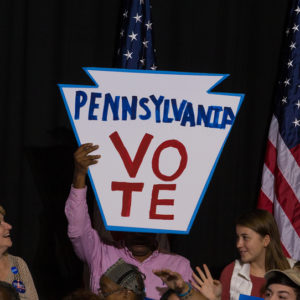Attorneys for the Trump campaign were back in court Tuesday arguing that poll watchers should be allowed into the “satellite election offices” created by Philadelphia. Blocking poll watchers from these polling sites has generated controversy since President Trump brought them up in a nationally televised debate seen by more than 77 million people.
“In Philadelphia they went in to watch,” Trump said at the September debate. “They’re called poll watchers. A very safe, very nice thing. They were thrown out. They weren’t allowed to watch. You know why? Because bad things happen in Philadelphia, bad things.”
Philadelphia used a grant from a Chicago-based nonprofit to establish numerous locations throughout the city in which a person may go request an absentee ballot, receive it, mark it, and deposit it all at the same time and in the same spot. Seven of them opened on Sept. 29, the same day as the presidential debate.
The Trump team argues the key word isn’t “satellite,” but rather “election.” These facilities may be temporary, but they should be treated like any other polling place and, therefore, accommodate poll watchers as provided for in Pennsylvania law, they argue. The city contends the sites are merely duplicates of the elections office in City Hall and no poll watchers are needed.
Tuesday’s hearing was an appeal in Commonwealth Court after the Trump team lost the first round in the Court of Common Pleas. Judge Gary Glazer sided with the city, saying it “would be the worst sort of judicial activism” for his ruling to insert poll watchers into election offices.
The appeal hearing was contentious, with the three-judge panel peppering Trump campaign attorney Ronald Hicks Jr., with questions from the start.
In particular, Hicks was pressed about whether he knew for a fact that government employees at the locations were providing any kind of assistance — an activity most people agree was meant to be observed by poll watchers.
“Can we grant [the] relief that you’re asking for, for speculative problems?” asked Judge Ellen Ceisler. “You have no evidence that it happened so it’s speculative at this point.”
“It’s not speculative that in-person voting is occurring here,” Hicks replied. “And as Judge [Patricia A.] McCullough indicated right up front, the whole purpose of poll watching is to determine whether those types of activities occur.”
The city’s attorney, Michael Pfautz, said polling places are only a thing that occurs on Election Day, according to Pennsylvania law.
At one point, Pfautz’s own words appeared to undermine his position when trying to explain why the city was opposed to allowing poll watchers into these locations in the first place.
“So, I think there are a couple of reasons both practical and legal,” Pfautz began. “One is the spaces and the poll workers, the poll workers weren’t trained — not the poll workers, the board of elections staff — weren’t trained for this. There are obviously concerns about Covid because some of these spaces are quite small.”
Hicks rebutted the coronavirus idea later, saying most of the locations were picked because they were large, such as school cafeterias.
“These are all large spaces which don’t have any Covid concerns; if they did, they wouldn’t have opened them up,” Hicks said.
Today’s hearing comes amidst a backdrop of a string of failed election-related legal actions brought by Republicans in Pennsylvania.
Late Monday evening, the U.S. Supreme Court declined to disturb a ruling by the Pennsylvania Supreme Court allowing ballots to be counted that are postmarked by Election Day but are received up to three days after. The court did not send a definitive message on the question at hand, however, as the justices were evenly split 4-4.
Republicans had appealed the Pennsylvania Supreme Court’s ruling, saying the state’s highest court overstepped its powers and acted in a legislative fashion when extending the deadline. Numerous media outlets nationwide called the ruling a “win for Democrats.”
Last week, a group of Republicans in Delaware County sued over a “pop-up” voting center at Subaru Park in Chester. The complaint argued that the mobile voting location approved by the Delaware County Elections Board was voted on in a way that violated the state’s sunshine laws.
One day after the suit was filed, a judge heard oral arguments and quickly issued a ruling in the same day, saying the Republican plaintiffs failed “to establish a clear right to relief,” which, in this case, was a request for an injunction to prohibit the mobile voting site from opening and operating at all.
In early October, a federal judge dismissed yet another suit by the Trump campaign, which sought to ban the use of drop boxes to collect ballots.
That case came back to haunt Trump’s attorney in today’s arguments before the appeals panel.
Judge Ceisler cited that federal case and said Trump’s legal team had claimed satellite election offices were not polling places.
Hicks responded by saying the case was focused on the primary election, and there were no such things as satellite election offices at that time.
“What was introduced for the first time in the primary were the use of unmanned, and, sometimes staffed, drop boxes. And that’s the issue we were addressing in federal court,” Hicks replied. “The existence of satellite election offices is a new creature that occurred after the primary.”
It’s not immediately clear how soon the court might rule, but the judges all made comments acknowledging a timely resolution is needed.
Update: The original version of this story said Philadelphia used money from a “California-based nonprofit.” The nonprofit is based in Chicago, and the story has been updated to reflect that.

